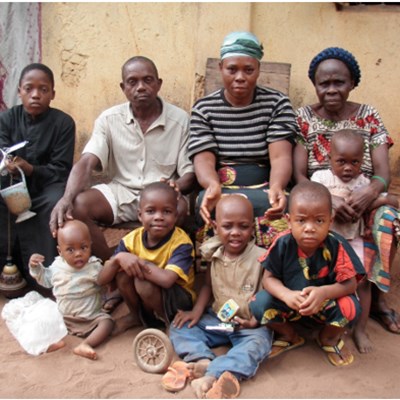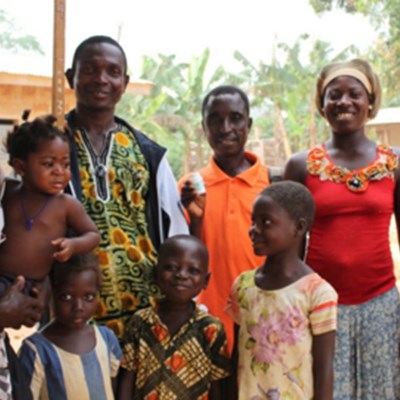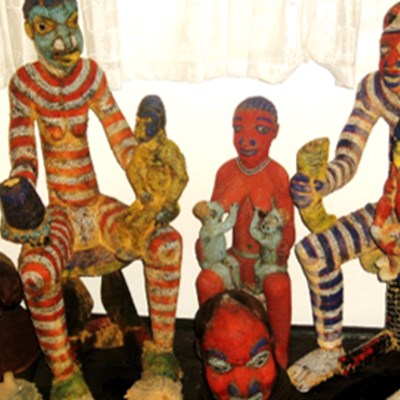Parenthood within African communities

Sean Thomas, Lagos, Nigeria, on neighbours as parents:
“I grew up in Lagos, it’s one of the world’s most populated cities, um, very hustle and bustle. It’s an island, a very small island actually, just like Britain, but with much, much people. I grew up in a very, very tight knit community where everybody knows the neighbours, and the neighbours are, are considered to be your parents as well. So, they says, this is the community that brings out the child, and that was one of the legacies I grew up with living in Lagos, Nigeria.”
Ofomu Clark, Edo State, on boys being valued more than girls in her culture:
“Yes, I think so, because, em, by our culture, the male child has been seen as special and the heir apparent to the family throne, because as a family, we believe that there is…there’s something to be preserved in the family, so, when a male child is being born, it’s like, it’s preserving the family’s name and it will take it into the next generation… The boys are treated differently in the homes, usually coz they feel like the girls are growing up to become mothers and so they have to play the mother…they have to be taught the motherly role that they will have to perform later in life. So, we do all the chores at home and the boys did less work. So, they were treated better than us, like we felt at the time. But growing up, at the moment, I’m so grateful that I learnt everything I learnt at that time. Because that’s what I have and I’m holding on to as a mother.”
Sean Thomas, Lagos, Nigeria, on both sexes being regarded equally in his culture:
“In Africa in my, where I come from, I can only speak for area which I grew up, which is Lagos, ehm, definitely, the man, the head of the family, was happy when he’s got a son, but it’s equally celebrated as much when they get a daughter.”
Abdualle, Mende, Freetown, Sierra Leone, on teaching his children his culture here in Glasgow:
“We have to teach them, we have to teach them about our culture, it is something that we have to be teaching them every day. I am happy to teach my children my culture and I am teaching them my culture.”
Chief Gift Amu Logotse, Ewe, Ghana, on the attitude of one family in his culture:
“Em, yes, my father did and so was my grandfather. So, my mother, my grandmother had ten children, nine daughters, one son. So, all our aunties and their children are our brothers and sisters as far as we’re concerned, and by Ghanaian tradition that’s the way it goes, we don’t call them cousins, no, we call them brothers, we call them sisters. So that made it more exciting, and there was no, no differentiation or demarcation in whose child this is, you know. We are all the one family, especially when we have the same surname, it makes it even exciting.”
Gloria Oju Onyekwere, Igbo, Kaduna State, Nigeria, on whether boys are valued more than girls in her culture:
“No, why should I do that?... My two daughters, I carried them for nine months, my son I carried him for nine months… The one that I would recommend we should fight about, is the way no girl child should be treated. You see a man that has got maybe one son and three girls, ehm, they would rather train the one son and leave the three girls away.”
Chief Suliman Chebe, Sissala, Ghana, on his upbringing:
“I had a very joyous upbringing, sometimes it was tough, life was tough sometimes but apart from the toughness and the difficulties, we ran out of some supplies and sometimes the water not been as clean as this side of the world. It was such a joyous upbringing that I will always remember with fond memories.”
Anani Fiado (Joe), Ewe, Togo, on bringing up children:
“If you go to a humble home you see the way children behave, so there’s no difference between the culture or the character, is the way you train your children. You brought them up to be humble, to be respectful and to prosper.”

Simon Koang, Nuer, South Sudan, on bringing up children in his culture:
“The men they don’t know how to care for the small kids, only the mother knows how to care for them.”
Simon Koang, Nuer, South Sudan, on what he is teaching his children about his culture now he is in Glasgow:
“Yeah, yeah, like my children, I’m teaching them from my language all the traditions, the respect, to understand my language to know my background… I talk to them about many things and they say, “What is that?””
Sarjo Koita, Mandinka, Gambia, on the differences between his upbringing and that in Glasgow:
“We were born in a polygamy family, where my father has two wives living in the same compound, so we all have grown up together… It’s very interesting, you see, because this old man will bring this whole family as one unit. So that’s the interesting thing about it and all the mothers, everybody will be together and we all get on well, unlike in this present generation where it’s almost impossible to do that.”
Nassar Lule, Baganda, Uganda, on whether boys are more celebrated than girls in his culture:
“Yes, yes, yes, that one is also happen a lot, because if you have a boy it means yes, yes, our clan now have getting a boy, so we having power. For the women, they don’t say anything because men and women in Uganda they don’t talk.”
Jean Albert Nietcho, Bamiléké, Cameroon, on baby boys being valued more than girls in his culture:
“Yeah, because, ehm, in my tradition, for in my family if I pass away, there is someone going to be taking over because of the succession. It have to be a boy, because a woman does not succeed a man and a man does not succeed a woman.”
Nelson Sule, Benin City, Nigeria, on teaching his cultural values to his children here in Glasgow:
“We are from Africa, it’s our heritage, we need to identify with it, its part, probably. My kids call me old school, but the values, I think, should be kept should be instilled in our kids growing up. The different values that we need to uphold.”
Alix Joseph Offorojamu, Nigeria, on teaching his children his culture whilst living in Glasgow:
“Yeah, yeah, as far as if you are, if you are born as a different minority, like Igbo, Yoruba, you must teach your children the culture as well.”
Kwaka Amankwah Frimaponna, Kumasi, Ghana, on how he is teaching his son about his culture whilst living in Glasgow:
“Yeah, I’ll try. Yeah yeah, to me, I’ll try, but depends the, the person. My boy, if they wish to be, there is no problem. Normally I teach them so they can learn many things about Africa, yeah.”
Pa Ebou Ngum, Wollof, Gambia, on whether girls are valued more than boys in his culture:
“Whatever your wife delivers, boy or girl, you left it in the hands of God, that’s what meant to be.”

Rohey Conteh, Mandinka, Gambia, on whether boys are more valued than girls in her culture:
“There are people who have their beliefs, and tribes that they always want to have a boy instead of girls, yeah, so definitely they will look for boys. It might be something like a bad luck if they don’t have a boy to inherit them, because a male can inherit when they are not around. To have a male child is very important to them.”
Twimukye Macline Mushake, Bakiga, Uganda, on how she was encouraged by her mother to exceed the expectations put on female children at the time:
“Well, I would say my childhood was happy, as I said, because I had loving parents. But, at the same time, it was challenging, because I had to walk that extra mile to have an education. Uhmm, there were things that were quite different because of my disability. That did not conform on expectations of the girl child. Because the women of my age grew up knowing that they were going to be someone’s wife at some point. And fulfil the duties of being a wife and mother. And my mother instilled in me, the belief that I’m not going to be that perfect wife, perfect mother. But I can be a professional. And I will never thank her enough for that, because, for me, the things I have done over the years! I’ve eventually become a wife. Eventually, as I can say. But, that was never my grounding. My grounding was me, being me. And being able to do the things I do because I have worked so hard to do them.”
Twimukye Macline Mushake, Bakiga, Uganda, on bringing her children up in Glasgow:
“I do, as an African, know that there is that identity that I want my children to have, and that is them being to be able to at least speak an African language when they go home… I think there is an advantage of being able to speak another language.”
Ali Abubakar, Zanzibar, on teaching his children Swahili here in Glasgow:
“I used, when the children were younger, to sing them Swahili songs, yeah. I didn’t teach them anything…just now sometimes. My son, Michael, would eh...I would ask him if he remembers because he went to Zanzibar twice. I, he remembers such and such a word in Swahili and interestingly he would remember a little bit.”
Mariarose Ngosi, Lilongwe, Malawi, on her upbringing:
“I had a good childhood. I didn’t stay at home much because I used to be in boarding school. Me and my sister went to boarding school since I was five years old. So, my whole life I spent much time in boarding school, which I liked it. It was a girls’ boarding school. After I went to High School, I was also in boarding school, so I didn’t spend much time at home, but when I was at home, being girls in Africa, we didn’t have much time to play with other kids because we were doing housework. My mum was very strict. She made sure we learned how to cook, to clean the houses and to do anything to do with the house. So, she didn’t let us much to go and play… She used to say that “the more time that you go and play with your girlfriends, you will be gossiping, and you be starting fight, so there is no point because if you go to your friends every single day what’re you going to be talking about? But if you go to your friends once a week or maybe three times in a month, at least you have something to talk about because you’ve missed each other for a while.” So, we spend more time in the house, yeah, doing housework or teaching us how to bake, yeah.”
Mariarose Ngosi, Lilongwe, Malawi, on the fact that girls are more celebrated than boys in her culture:
“Eh, I would say maybe girls are more celebrated than boys because there are so many things can be done by girls than the boys. When it comes to the lavora (dowry) like in my family’s culture, it’s the boy who pays the lavora. The boys pay to the girls. Yeah, so I would say girls get celebrated more than boys… For my son, I would want him to learn, but it’s up to him if he wants to learn because he was not born in Malawi, he was born in Scotland, but it’s good for them to know where they are from, where they existed. It’s good to know but it’s up to them. If they want to learn, then yes, definitely yes. I would love my son to know exactly where I’m from, to know my family and stuff. I’ve introduced to them anyway, but later on I can’t choose for him.”
John Unis, Freetown, Sierra Leone, on teaching his children about his culture whilst in Glasgow:
“We have to keep our children informed about Africa, where we came from and some of the history. At the same time, we are taking them back home to see where their great, great parents came from, so in future they can get the bigger advantage of interacting with the Africans and with the Europeans, which will make them much better.”
Next page: Leadership and Governance